
High-asset divorces involve at least one spouse with more than $1 million in accumulated wealth or assets. Divorces of this type can be complex and often take much longer to settle, particularly if one spouse has higher financial standing. High-asset divorces are those in which the divorcing couple has more complicated investments than traditional bank accounts, basic investments, or business interests.
How Do High-Asset Divorces Differ From Standard Divorces?
In addition to the vast wealth and property, high-asset divorces differ due to several factors, such as:
- Cost: High-asset divorces cost significantly more due to the number of high-value assets and financial interests, plus the cost of legal fees, forensic accountants, and other experts.
- Length: High-asset divorces involve considerably more time to identify and locate all assets and accurately calculate their value.
- Tax implications: Taxes must be paid on marital assets and are considerable due to their high value.
- Property: Determining the division of property, both marital and separate, takes time, especially in divorces involving multiple real estate, numerous financial accounts, investments, and businesses.
- Mediation: High-asset divorces often utilize private mediation rather than the courts to protect their privacy regarding the extent of assets. Divorces handled by courts become public records and risk the publication of a couple’s holdings and the settlement details. Mediation also offers a faster method of divorcing, lowering the overall costs.
What Assets Are Common in a High-Asset Divorce?
Many high-asset divorces involve a longstanding family-owned business or closely held corporation. Equitable distribution and property laws dictate that family businesses are typically considered marital property, even if only one spouse owns the business. Other common assets include:
- Boats and other high-value vehicles
- Business investments and closely held enterprises
- Domestic and international bank accounts
- Family heirlooms
- Fine artwork
- High-dollar retirement accounts or pensions
- High-value primary residence and vacation residences
- Intellectual property
- Long-term employment incentives
- Offshore investments
- Portfolios of other investments
- Real estate holdings other than residences
- Stock options and investments
- Trust funds
How Is Marital Property Divided in New Jersey?
Regardless of the type of divorce, couples need to understand the state laws about the division of marital property. State laws identify assets as either community or equitable. In community property states, all assets are divided equally, regardless of whether they were acquired during the marriage. New Jersey is an equitable distribution state, meaning the courts divide assets fairly but not necessarily equally.
Marital property is acquired during the marriage and includes real estate, bank accounts, financial investments, retirement accounts, and more. Separate property is acquired by one spouse before or outside of the marriage, such as:
- Inheritance acquired before or during the marriage
- Property and real estate owned before the marriage
- Property titled only to, and purchased solely by, one spouse, with a written agreement to be held as a separate asset
Though rare, there are instances when assets usually deemed separate are classified as marital property, such as one spouse using a pre-marriage inheritance to purchase the marital home or paying for the other spouse to obtain an education. When solely-owned assets are co-mingled with marital assets, they may become marital assets and be divided. For this reason, it is vital in a high-asset divorce to have legal documentation showing assets are not co-mingled during the marriage.
What Happens to Shared Business Interests During High-Asset Divorces?
Division of family or closely held businesses is one of the most challenging aspects of a high-asset divorce due to several factors, including:
- Valuating the family or closely held business.
- Distributing ownership interests or assets.
- Ascertaining how a business will continue to operate following a divorce case’s conclusion.
- Establishing parameters of how assets should be divided following the sale of a business should the parties choose to sell during the divorce.
- Establishing parameters for both parties to continue running a business jointly.
Unfortunately, some spouses with closely held businesses try to hide assets within businesses, most commonly when one spouse actively engages in business operations more than the other. Identifying hidden assets in closely held businesses is one of the more challenging factors that must be investigated.
What if I Suspect My Spouse Has Hidden Assets?
Hidden assets and concealed debts are much more common in high-asset divorces. High-net-worth individuals often have many assets in multiple forms and many locations. Out-of-state and offshore bank accounts, businesses, real estate, and investments are common in high-asset divorces.
Hidden assets are one reason a lawyer is necessary for high-asset divorces. Experienced divorce lawyers with a background in high-asset divorce cases have an established network of experts who can locate hidden assets and debt. Forensic accountants have the experience and skill set to identify financial irregularities and provide valuable testimony and documentation during divorce proceedings.
Another significant component of high-asset divorces is determining the value of assets, which typically requires hiring valuation appraisers to assess their worth.
Am I Eligible for Alimony in a High-Asset Divorce?
High-asset divorces can be contentious, and alimony, or spousal support, is one of the main reasons. In many high-asset divorces, one spouse often earns more than the other, and divorcing will significantly affect the other’s standard of living during and after the divorce. This often results in one spouse paying alimony for some time. Courts decide on the amount and length of spousal support based on several factors, including but not limited to:
- Each spouse’s current income from all sources.
- Earning ability of both spouses following the divorce.
- Standard of living during the marriage.
- Current health status of both spouses.
- Each spouse’s contributions to the marriage.
- Assets and liabilities of each spouse.
- Tax consequences of spousal support for each spouse.
- Length of the marriage.
- Any other relevant factors.
How Can a New Jersey High-Asset Divorce Lawyer Help Me?
A lawyer will know the particular state divorce laws, ensuring property division and spousal support will be handled in your best interests. A lawyer will also file the correct paperwork, retain experts to gather and value assets, negotiate with your spouse’s lawyer if necessary, and represent you in court.
Divorce can be difficult. Hiring a lawyer helps alleviate some stress and provides peace of mind.
New Jersey High-Asset Divorce Lawyers at Wiley Lavender Maknoor, PC Can Protect Your Rights
You have a lot at stake during a high-asset divorce. Our New Jersey high-asset divorce lawyers at Wiley Lavender Maknoor, PC understand the complexities and challenges. Protecting your rights is our top priority. Call us at 732-494-6099 or contact us online to schedule a free consultation. Located in Metuchen, New Jersey, we serve clients in Middlesex County, Monmouth County, Union County, and Somerset County.
 Google Screened
Google Screened
